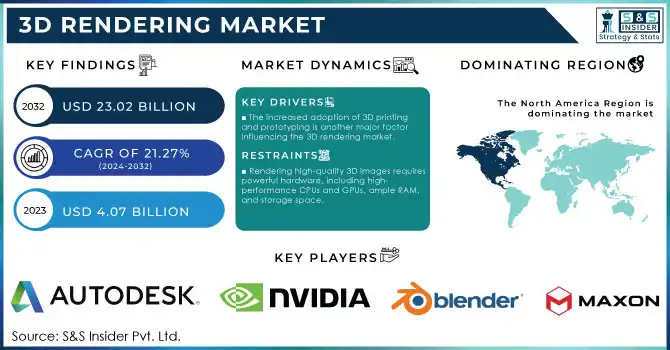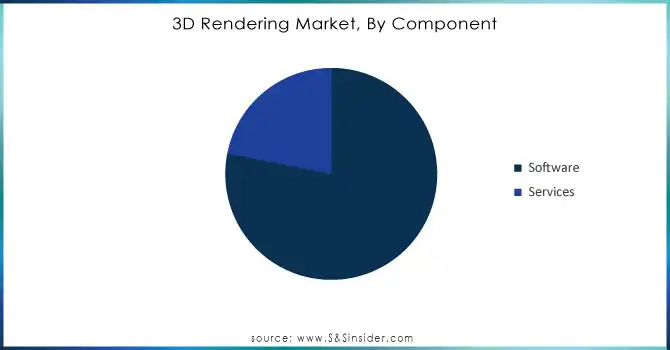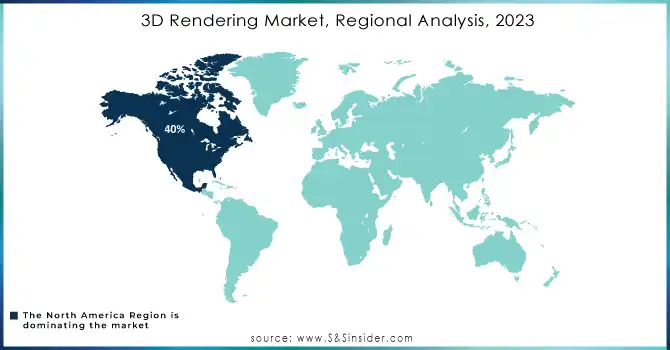3D Rendering Market Key Insights:
The 3D Rendering Market was valued at USD 4.07 billion in 2023 and is expected to reach USD 23.02 billion by 2032, growing at a CAGR of 21.27% over the forecast period 2024-2032.

Get More Information on 3D Rendering Market - Request Sample Report
The 3D rendering market is experiencing significant growth, driven by several key factors, including the rapid adoption of advanced rendering software and cutting-edge hardware technologies. As augmented reality (AR) and virtual reality (VR) applications continue to gain traction, with around 1.4 billion active AR devices and 90 million users in the United States alone in 2023, demand for 3D visualization and 3D modeling has surged. Approximately three in four adults under the age of 44 are aware of AR, signaling a strong consumer base for AR-powered experiences, which is further fueling market expansion. The rise of digital platforms and e-commerce has also played a critical role, as businesses seek to enhance online shopping experiences with 3D product visualization to improve customer engagement and sales, along with driving market growth.
In industries such as automotive design, the application of 3D rendering is transforming how manufacturers approach product development and marketing. Automotive companies utilize 3D rendering for prototype visualization, virtual vehicle testing, and simulations of aerodynamics, safety features, and structural integrity. This reduces the need for costly physical prototypes, saving both time and money. Moreover, the automotive sector increasingly relies on 3D marketing and advertising to create immersive, visually stunning promotional content, offering consumers an enhanced and realistic experience of new vehicle models. As these trends continue to evolve, the 3D rendering market is expected to expand significantly, fueled by increasing demand across various industries like entertainment, automotive, e-commerce, and more.
Market Dynamics
Drivers
-
The growing need for top-notch visualizations in industries like architecture, engineering, automotive, entertainment, and gaming is a key factor driving the 3D rendering market.
Industries that depend on intricate visual representations of designs and prototypes have been utilizing 3D rendering technologies for a long time to generate lifelike simulations. In the field of architecture, 3D rendering enables architects and clients to envision building plans and make changes before beginning construction. Rendering in product design and automotive sectors allows for lifelike prototype simulations, making design and testing processes easier. The desire for lifelike and immersive visuals in gaming and entertainment has driven the utilization of state-of-the-art rendering technologies. Video games are becoming increasingly visually sophisticated, demanding advanced graphics engines that offer lifelike settings and character designs. Likewise, 3D rendering plays a vital role in the film sector for VFX and animation, enabling filmmakers to produce captivating and lifelike visuals that elevate storytelling. Industries are turning to 3D rendering technology more and more to satisfy consumers looking for more realistic and visually impressive experiences.
-
The increased adoption of 3D printing and prototyping is another major factor influencing the 3D rendering market.
3D printing has transformed product development in different sectors, including manufacturing, automotive, healthcare, and fashion. 3D rendering is necessary to create precise 3D models before beginning the process of 3D printing. Designers and engineers utilize 3D rendering to visually perfect their ideas before creating physical prototypes. For instance, in automotive design, manufacturers depend on 3D rendering to produce intricate models of car components and structures. Before being manufactured with 3D printing technologies, these models can undergo testing for fit, form, and function. Likewise, in the fashion sector, designers utilize 3D rendering to make virtual prototypes of clothing, enabling them to see their designs before manufacturing. This not only decreases the amount of material wasted but also accelerates the process from design to production. As 3D printing becomes more popular in different sectors, there will be an increasing need for top-notch 3D rendering tools to assist in the development of precise models.
Restraints
-
Rendering high-quality 3D images requires powerful hardware, including high-performance CPUs and GPUs, ample RAM, and storage space.
Many rendering processes are computationally intensive and require substantial processing power. As a result, businesses may need to invest in specialized hardware or upgrade their existing infrastructure to keep up with the demands of modern 3D rendering. For small to medium-sized businesses, the cost of acquiring and maintaining this high-performance hardware can be prohibitive. Even with access to advanced rendering software, without the appropriate hardware, users may face long rendering times and subpar results. This can create delays in project timelines, increasing the overall cost of production. Cloud-based rendering services have mitigated this challenge by providing access to remote computing resources, but they come with their own costs and limitations, such as dependency on a stable internet connection and data security concerns. The high hardware requirements, coupled with the significant financial investment needed to meet them, remain a major restraint for many businesses in the market.
Key Segmentation Analysis
By Component
In 2023, the software segment held the majority share of 78% and led the market. Software designed for 3D rendering provides features for generating top-notch, lifelike visuals and animations by utilizing sophisticated algorithms and strong hardware support. These applications are widely utilized in fields like gaming, architecture, automotive design, and film production. Major companies such as Autodesk and Blender offer sophisticated 3D modeling, rendering, and animation software that are commonly utilized in animation studios, design companies, and gaming firms.
The services segment is projected to become the fastest-growing with a raid CAGR during 2024-2032 because of the growing demand for instant, top-notch rendering solutions that don't require large infrastructure investments. Numerous companies choose service-based options to utilize expert 3D rendering without having to keep up with in-house capabilities. Key players like Luxion and Chaos Group provide services such as KeyShot Cloud Rendering and V-Ray Cloud, allowing clients from different industries to complete rendering tasks on external servers, which helps to lower both time and cost.

Need Any Customization Research On 3D Rendering Market - Inquiry Now
By Operating System
In 2023, the Windows segment dominated with a 49% market share, due to its adoption in both professional and consumer sectors, as well as its strong backing of 3D rendering applications. Top 3D rendering software like Autodesk’s 3ds Max, Blender, and V-Ray are well-designed for Windows operating systems. Autodesk and other companies use Windows to support their 3D visualization tools, making it the preferred platform for professionals in the industry.
The MacOS is expected to experience the highest growth rate during 2024-2032 in the 3D rendering market. Apple's emphasis on powerful hardware like the M1 and M2 chips has made MacOS more appealing to those in creative professions. These chips offer excellent performance for tasks such as 3D rendering due to their superior computational power. Moreover, MacOS provides smooth compatibility with sophisticated rendering software such as Cinema 4D, Autodesk Maya, and Blender, specifically designed to perform well on Apple devices.
Regional Analysis
In 2023, North America held a 40% market share and led the market, due to the notable existence of important competitors, progress in technology, and high need in sectors like entertainment, gaming, automotive, and architecture. North America also benefits from significant investments in research and development, as well as the widespread use of 3D rendering technologies. The entertainment sector, especially Hollywood studios, and video game firms like Epic Games utilize sophisticated 3D rendering in their work.
The APAC region is projected to experience the highest growth rate during 2024-2032, fueled by quick technological integration and industrial expansion in nations such as China, India, and Japan. Autodesk, Blender, and Chaos Group are prominent companies that have solidified their presence in the region by offering 3D rendering software solutions to various industries. For instance, the gaming industry in Japan, including Sony and Nintendo, heavily relies on 3D rendering for game development and visual enhancements.

Key Players
The major key players in the 3D Rendering Market are:
-
Autodesk (Autodesk 3ds Max, Autodesk Maya)
-
Chaos Group (V-Ray, Chaos Phoenix)
-
NVIDIA (NVIDIA Iray, NVIDIA Omniverse)
-
Blender Foundation (Blender, Cycles)
-
Maxon (Cinema 4D, Redshift)
-
Solid Angle (Arnold, Arnold GPU)
-
Luxion (KeyShot, KeyVR)
-
Unity Technologies (Unity 3D, Unity Reflect)
-
Epic Games (Unreal Engine, Quixel Megascans)
-
Red Giant (Universe, Magic Bullet Suite)
-
Otoy (OctaneRender, OTOY Render Network)
-
The Foundry (Maya Render, Modo)
-
Next Limit Technologies (Maxwell Render, RealFlow)
-
Pixar Animation Studios (RenderMan, Presto)
-
Autodessys (FormZ, Rendering Suite)
-
KeyShot (KeyShot Animation, KeyShotXR)
-
SimLab Soft (SimLab Composer, SimLab VR Viewer)
-
Artlantis (Artlantis Render, Artlantis Studio)
-
Daz 3D (Daz Studio, Daz 3D Render)
-
LightWave 3D (LightWave Render, LightWave 3D Modeler)
Providers of Software/Platforms for 3D Rendering Manufacturers:
-
Microsoft
-
Amazon Web Services (AWS)
-
Google Cloud
-
Autodesk
-
Chaos Group
-
NVIDIA
-
Adobe
-
Red Giant
-
Maxon
-
Epic Games
Recent Developments
-
February 2024: Autodesk and Cadence revealed a significant collaboration to revolutionize the way circuit boards and 3D models are designed.
-
August 2024: Autodesk introduced an AI-driven process named Flow Generative Scheduling for artists and producers, along with additional AI capabilities for its Maya and Flame software.
-
August 2024: In the initial "Unboxed" event of a series, Chaos, the creator of visualization technology, unveiled its upcoming 2024 roadmap, showcasing new products, tools, and a continued dedication to integrating the entire Chaos ecosystem.
| Report Attributes | Details |
|---|---|
| Market Size in 2023 | USD 4.07 Billion |
| Market Size by 2032 | USD 23.02 Billion |
| CAGR | CAGR of 21.27% From 2024 to 2032 |
| Base Year | 2023 |
| Forecast Period | 2024-2032 |
| Historical Data | 2020-2022 |
| Report Scope & Coverage | Market Size, Segments Analysis, Competitive Landscape, Regional Analysis, DROC & SWOT Analysis, Forecast Outlook |
| Key Segments | • By Component (Software, Services) • By Operating System (Windows, MacOS, Linux) • By Organization Size (SMEs, Large Enterprises) • By End User (Architecture, Engineering & Construction, Automotive, Healthcare, Gaming, Manufacturing, Media & Entertainment, Others) |
| Regional Analysis/Coverage | North America (US, Canada, Mexico), Europe (Eastern Europe [Poland, Romania, Hungary, Turkey, Rest of Eastern Europe] Western Europe] Germany, France, UK, Italy, Spain, Netherlands, Switzerland, Austria, Rest of Western Europe]), Asia Pacific (China, India, Japan, South Korea, Vietnam, Singapore, Australia, Rest of Asia Pacific), Middle East & Africa (Middle East [UAE, Egypt, Saudi Arabia, Qatar, Rest of Middle East], Africa [Nigeria, South Africa, Rest of Africa], Latin America (Brazil, Argentina, Colombia, Rest of Latin America) |
| Company Profiles | Autodesk, Chaos Group, NVIDIA, Blender Foundation, Maxon, Solid Angle, Luxion, Unity Technologies, Epic Games, Red Giant, Otoy, The Foundry, Next Limit Technologies, Pixar Animation Studios, Autodessys, KeyShot, SimLab Soft, Artlantis, Daz 3D, LightWave 3D |
| Key Drivers | • The growing need for top-notch visualizations in industries like architecture, engineering, automotive, entertainment, and gaming is a key factor driving the 3D rendering market. • The increased adoption of 3D printing and prototyping is another major factor influencing the 3D rendering market. |
| Restraints | • Rendering high-quality 3D images requires powerful hardware, including high-performance CPUs and GPUs, ample RAM, and storage space. |

